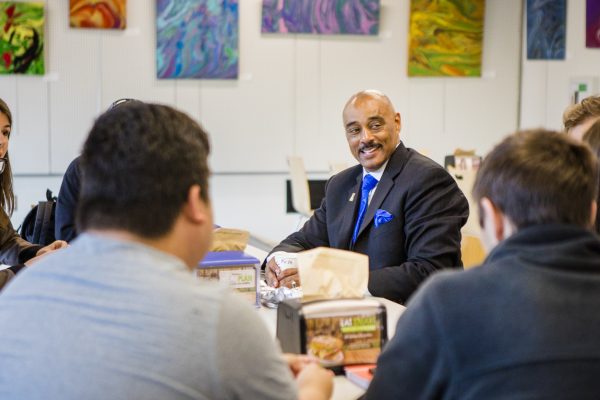Friday Focus: High hopes
May 2, 2019

— by Keith Champagne, vice chancellor for student affairs
In my previous columns, I have written about , and .
Today, I want to talk about hope and leadership given the political and fiscal landscape and the complexity and uncertainty that we are navigating as an institution. I believe in and subscribe and adhere to the kind of hope where you desire for a better time, place and space. This definition of hope is based on C. R. Snyder’s “hope theory.” With this theory, hope is conceptualized as a goal-directed construct with both affective and behavioral implications. This type of goal is defined as what we as individuals or a university community desire to get, do, be, experience or create. Our goals are and can be a source of positive emotions.
As a leader, I am a “high hope” person. I am going to work with others to find many pathways to reach or achieve our desired goal or goals to overcome or circumvent any obstacles that we may encounter. For example, as a person raised by a single mother in the housing projects and on welfare, during those difficult times when we had nothing else, we had hope or high hope that tomorrow was going to be a better day or time.
One of my favorite songs is the "Little Ant" song. “Just what makes that little ant think he can move a rubber tree plant — high hopes.” In fact, on my desk today is a box with the words “High Hope” written several times across that box, and inside the box is a small group of toy ants. When I learned of Gov. Dunleavy’s budget proposal and the cuts to the University of Alaska system, I reached for that box and I went to YouTube and played that Little Ant song. If the Little Ant does not work for you, maybe the children’s book “The Little Engine That Could” might work for you regarding agency, which is another component of hope. For instance, agency is defined as "the thoughts people have regarding their ability to begin and continue to move forward on an identified pathway towards goal achievement.” Hence, the "I think I can" phrase provides one with the necessary motivation to pursue their stated goals.
Now, some of you may be wondering, “Why is he sharing this and going on about children’s nursery rhymes, songs and books?” Well, I simply cannot walk around, move through life or be a university leader without hope or high hope.
Moreover, I am focusing on hope-high-hope because we are a world-class major public research university and we are a Land Grant university that has a responsibility and covenant with the citizens of the great state of Alaska to serve and move this great institution forward in a positive manner with hope-high-hope vision and a pathway for a better day, time, space and place.
In essence, we in executive positions need to be hope leaders. Hope leaders demonstrate an indomitable spirit and a tenacious desire to keep this university focused on an inspiring and meaningful vision regardless of the political and fiscal landscape that we as leaders are presented and confronted with.
In closing, I want you to think about Jacob Riis’ Stonecutters Credo: “When nothing seems to help, I go back and look at the stonecutter hammering away at his rock perhaps a hundred times without as much as a crack showing in it. Yet at the hundred and first blow it will split in two, and I know it was not that blow that did it, but all that had gone before.”
This is the kind of attitude and approach we need to have at –‘”˚…Á going forth.


